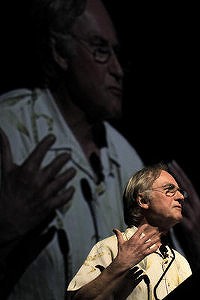This last weekend, thousands of atheists convened in Melbourne, Australia for The Rise of Atheism: the 2010 Global Atheist Convention. Reports from the event indicate that it was more concerned with mocking religion than it was with focusing on building a cohesive, values-based secular movement — a seeming epidemic in secular community-building today.
Barney Zwartz, religion editor of The Age, wrote: “If it was to validate hardline atheists to themselves and give them confidence, it was a triumph. If it was to take a mature look at how to advance the cause of secularism, politically and socially, the speakers should probably have spent less time ridiculing religion and more on positive and practical ideas.”
Andrew Bolt at the Herald Sun said the event was so mean-spirited that it made him want to believe in God:
“I’ve never felt more like believing in God. Especially the Christian one. My near conversion occurred because the convention’s speakers managed to confirm my worst fear. No, it’s not that God may actually exist, and be cross that I doubted. It’s that if the Christian God really is dead, then there’s not much to stop people here from being barbarians… Yes, I know godlessness need not mean good-lessness. I’m agnostic myself, yet think myself morally serious. But I’m certain both the Pope and Fielding would feel their Christian faith prevented them from vilifying Dawkins as his fellow atheists freely vilified them. So why do leading atheists, so sure of their superior morality, feel licensed to be meaner than leading Christians? Is this what morally superior people do when God has gone? In that case, bring God back.”
Melanie Phillips wrote in The Australian that the event functioned much like the religious fundamentalism it claimed to critique:
“Such indoctrination is a hallmark of the fundamentalist who knows he is not just right but righteous. So all who oppose him are by definition not just wrong but evil. Which is why alternative views must be howled down or suppressed. This is, of course, the characteristic of all totalitarian regimes, including religious inquisitions. Which is why Dawkins can lay claim to being not the most enlightened thinker on the planet, as his acolytes regard him, but instead the Savonarola of scientism and an intolerant closer of minds.”
Rachel Holkner of The Guardian reported this bit of strong anti-religiousness:
“When a Christian stood up to ask a question of Dawkins, there was a vibe not only of hostility, but impatience and frustration – even a sense of violation, as no one expected anyone with honest-to-god beliefs to pay the not-inconsiderate ticket price to learn about atheism. This was a great shame. Part of the challenge of atheism is extending our visibility and educating theists on rational thought. Continuing to play to the stereotype of being scary and intolerant will not help anyone. Atheists need to develop a reputation for patience and approachability.”
Responding to that, Gina Welch of True/Slant noted that the conference was very antagonistic to any religious presence, writing that it contained the “same fearful insularity poisoning many churches. Atheists should welcome questions and challenges from believers, shouldn’t we? Why shy away from a little repartee?”
Tim Roberts of Eureka Street wisely observed in advance of the conference that the program reflected a problematic insularity:
“Failing to include debating panels with religious moderates is a missed opportunity… Forging links with moderates against religious extremism should be the first goal of any atheist movement. Change cannot be achieved by eliminating religion, as people’s personal beliefs cannot be forcefully harangued into shape. Only by respectfully forming alliances with the moderate religious community will atheists be able to preserve the elements of society that they value most, such as freedom of enquiry and the separation of Church and State. The ego-driven, take-no-prisoners approach dooms atheism to remain an exclusive and tiny club… Despite its many worthy contributors, the convention will drown in a sea of bile unless the movement’s adherents realise that they can’t remake the world in their own image. Padding the program with snide comic relief puts the event in danger of being dismissed as a weekend of navel-gazing, rather than a genuine attempt to deal with intolerance. And that would be a pity.”
Is this really how we want to be seen? As anti-religious zealots and self-important isolationists patting ourselves on the back for our beliefs while refusing to practice the open-mindedness we preach? I sure don’t. Dick Gross of the National Times offered some shrewd counsel for the movement regarding this problem in his write-up in advance of the conference:
“For atheism to progress as a movement we need to go beyond bashing all believers and explore the common humanity which exists between the two camps. We unbelievers will never walk in harmony with those of trenchant and fundamentalist belief. That will never happen and should never happen. But our future growth lies in finding those believers with complicated notions of the deity who are tolerant and progressive. I am sick of seeing these people being bashed to bits just as I am sick of atheism remaining a marginal movement centuries after this incarnation of unbelief began.”
I couldn’t agree more. I’m attending two secular conferences next month — I hope they will reflect a more open-minded desire to engage difference respectfully than this conference seemed to.

